Vegan/Vegetarian Ramen and Gyoza
Vegan and vegetarian ramen enthusiasts can indulge in a flavorful and satisfying bowl of goodness, free from animal-derived ingredients, thanks to a variety of innovative plant-based ingredients and clever substitutions. Rich, umami-rich broths made with mushrooms, seaweed, and soy sauce complement a variety of vegetables and noodles. Gyoza filling options are endless, featuring ingredients like cabbage, mushrooms, and tofu. From rice-based to buckwheat soba noodles, there’s a perfect match for every palate. As plant-based ramen and gyoza continue to evolve, the possibilities for creative combinations and flavors are truly endless.
Just The Basics
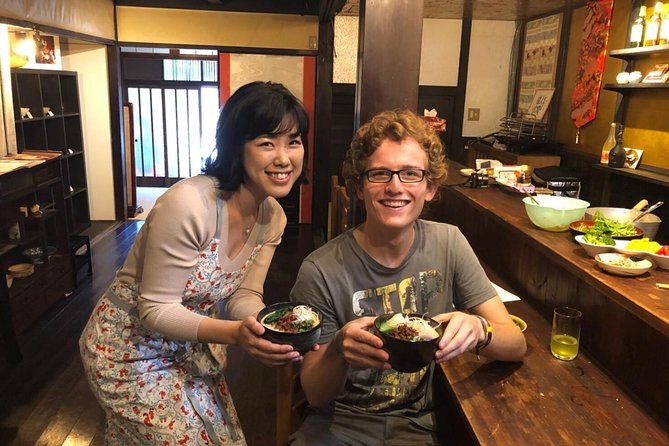
• Vegan ramen broth can be rich and flavorful, using ingredients like mushrooms, seaweed, and soy sauce for depth of umami flavor.
• Gyoza fillings can be customized with vegan ingredients like mushrooms, tofu, and tempeh to suit various tastes and dietary needs.
• A variety of vegan noodle options are available, including rice-based, buckwheat soba, and udon noodles, catering to different preferences.
• Plant-based gyoza sauces can be crafted using ingredients like soy sauce, rice vinegar, and sesame oil to create unique and balanced flavors.
• Experimentation with ingredients and flavor combinations can help create a vegan ramen and gyoza experience that rivals traditional counterparts.
It's also worth checking out some other tours and experiences nearby.
Vegan Ramen Essentials
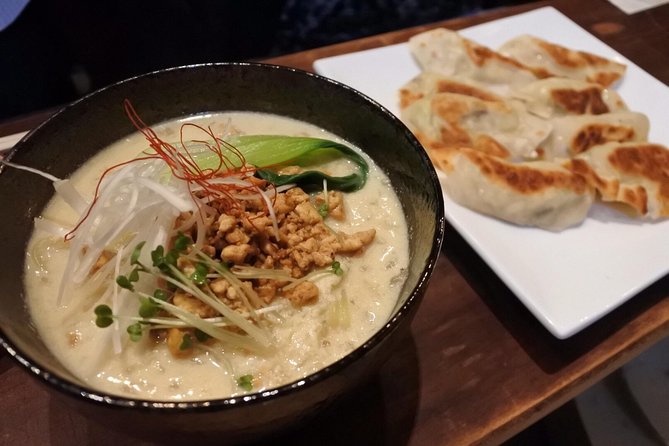
In the world of vegan cuisine, a steaming bowl of ramen is no longer off-limits, thanks to innovative ingredients and techniques that replicate the rich, savory flavors of traditional Japanese ramen.
Vegan ramen essentials begin with a rich, flavorful broth, often made with plant-based ingredients like mushrooms, seaweed, and soy sauce.
Next, a variety of vegetables, such as bok choy, carrots, and green onions, add texture and flavor.
Finally, a choice of noodles, including rice-based or zucchini noodles, completes the dish.
Gyoza Filling Options
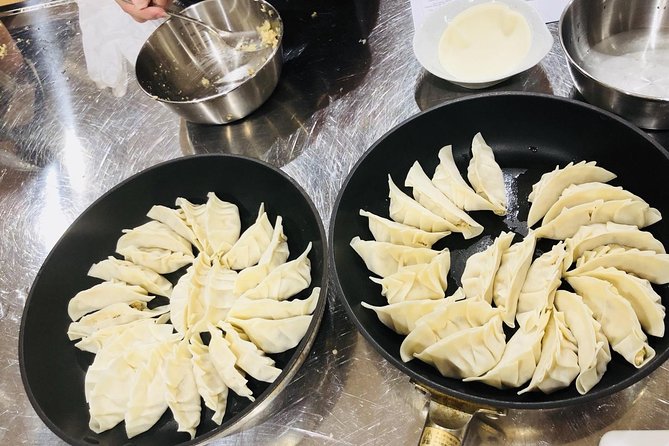
Gyoza filling options abound, offering a world of flavors and textures to complement the crispy, pan-seared dumpling wrappers.
For vegans and vegetarians, the possibilities are endless.
Classic combinations like cabbage, garlic, and ginger create a savory, umami flavor profile.
Mushroom-based fillings, such as shiitake and cremini, add an earthy depth.
For a pop of color and freshness, fillings featuring shredded carrots, bean sprouts, and scallions provide a delightful contrast.
Even tofu and tempeh can be used to add protein and creaminess.
With a little creativity, the perfect gyoza filling can be crafted to suit any taste or dietary requirement.
Experiment with different ingredients to find the perfect harmony of flavors and textures.
Broth Basics for Vegans
Vegan ramen broths typically rely on a combination of umami-rich ingredients, such as mushrooms, seaweed, and soy sauce, to create a rich, savory flavor profile.
These ingredients work together to create a depth of flavor that’s often associated with traditional animal-based broths.
Mushrooms, especially varieties like shiitake and cremini, add an earthy, meaty flavor, while seaweed contributes a briny, oceanic taste.
Soy sauce, meanwhile, provides a salty, savory element.
By combining these ingredients in varying proportions, vegan ramen enthusiasts can create a wide range of broths that are both satisfying and delicious.
With a little experimentation, it’s possible to craft a vegan ramen broth that rivals its traditional counterparts.
Noodle Choices for Vegetarians
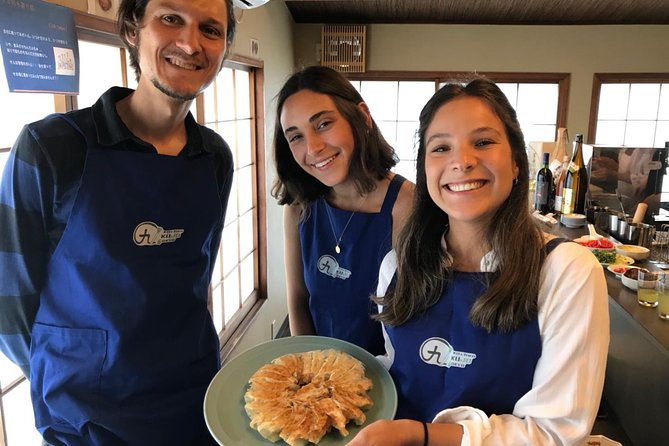
When it comes to choosing the perfect noodles for vegetarian ramen, enthusiasts can opt for a variety of options that cater to their dietary preferences.
One popular choice is rice-based noodles, which are naturally gluten-free and vegan-friendly.
Another option is buckwheat soba noodles, made from buckwheat flour and water, offering a nutty flavor and chewy texture.
Plus, vegetarian ramen enthusiasts can explore udon noodles made from wheat flour, or even explore Asian-style noodles like rice stick noodles or mung bean noodles.
These diverse options allow vegetarians to indulge in a satisfying and flavorful bowl of ramen, tailored to their unique tastes and dietary needs.
Plant-Based Gyoza Sauces
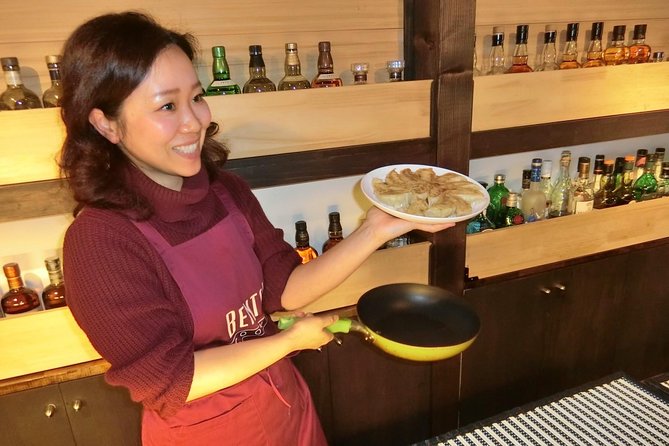
In the pursuit of creating an unforgettable plant-based gyoza experience, a carefully crafted sauce can elevate the dish from ordinary to extraordinary.
A well-balanced sauce complements the delicate flavors of the gyoza, adding depth and complexity to the dish.
For a savory and umami-rich sauce, consider a combination of soy sauce, sake, and mirin.
Alternatively, a tangy and refreshing sauce can be achieved with a mixture of rice vinegar, Gochujang, and sesame oil.
When selecting a plant-based gyoza sauce, it’s essential to prioritize flavors that won’t overpower the delicate dumplings.
Cooking Methods for Ramen
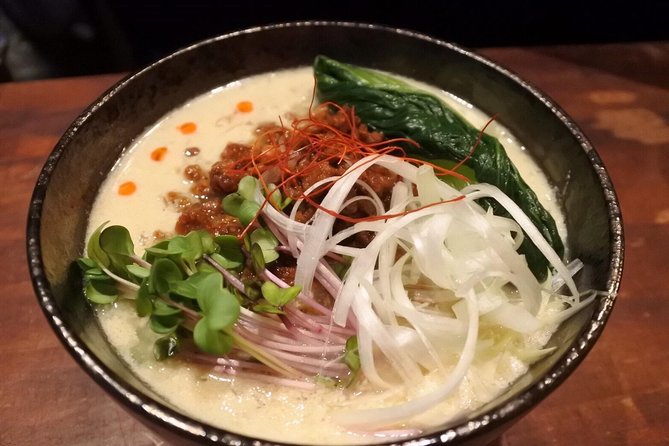
Mastering various cooking methods is crucial to crafting a rich, savory, and authentic ramen broth, as it allows for a deep extraction of flavors from the selected ingredients.
Two popular methods for cooking ramen are simmering and pressure cooking.
Simmering involves gently boiling the ingredients for an extended period, usually 4-6 hours, to extract the flavors. This method is ideal for delicate ingredients like vegetables and mushrooms.
Pressure cooking, on the other hand, uses high pressure to accelerate the cooking process, reducing cooking time to under an hour. This method is perfect for tougher ingredients like bones and seaweed.
Vegan Ramen Toppings Guide
Vegan ramen enthusiasts can elevate their bowls with a variety of creative toppings, carefully chosen to complement the rich, savory broth.
From crunchy vegetables like bean sprouts and shredded carrots to protein-packed options like tofu and tempeh, the possibilities are endless.
For added flavor and texture, consider adding sliced scallions, grated ginger, or crispy garlic.
Don’t forget about the umami boost from ingredients like mushrooms, seaweed, or vegan sesame seeds.
With a little creativity, vegan ramen enthusiasts can craft a truly unforgettable bowl.
Gyoza Cooking Techniques
Six essential techniques can elevate gyoza cooking skills, from pan-frying to steaming, and transform this humble dish into a culinary masterpiece. Mastering these techniques will take your vegan/vegetarian gyoza game to the next level.
-
Pan-frying: Achieve a crispy bottom and tender interior with the right pan-frying technique.
-
Steaming: Preserve the delicate flavors and textures of your gyoza filling with steaming.
-
Boiling: Quickly cook large batches of gyoza with the boiling method.
-
Pan-steaming: Combine the benefits of pan-frying and steaming for a crispy-soft gyoza.
Frequently Asked Questions
Is the Cooking Class Suitable for Beginners With No Cooking Experience?
She confirms that the cooking class, operated by BentoYa Cooking, is suitable for beginners with no cooking experience, as it’s designed to accommodate a maximum of 6 travelers, ensuring personalized guidance.
Can I Customize the Recipe to Accommodate Specific Dietary Restrictions?
She can inquire about accommodating specific dietary restrictions when booking, as the cooking school, operated by BentoYa, is open to customizations, ensuring a personalized experience for participants with unique needs.
Are the Cooking Classes Conducted in English or Japanese?
She can expect the cooking classes to be conducted in English, as the operator, BentoYa Cooking, Japanese Vegan/Vegetarian Cooking School, caters to international travelers, ensuring language barriers don’t hinder the culinary experience.
Will I Receive a Recipe Booklet or Digital Copy After the Class?
She will likely not receive a recipe booklet or digital copy after the class, as the website doesn’t mention it; however, she can always ask her instructor during the cooking class.
Can I Book a Private Cooking Class for a Larger Group or Event?
She can book a private cooking class for a larger group or event, but it’s essential to contact BentoYa Cooking, Japanese Vegan/Vegetarian Cooking School, directly to discuss customized options and arrangements, as the standard tour has a maximum of 6 travelers.
Not for you? Here's more of our most recent tour reviews happening neaby
- Small-Group Walking Tour With Udon Cooking Class in Hino
- Nature Tour at Mt. Takao
- Private Transfer From Tokyo Hotels to Tokyo Cruise Port
- Tachikawa to Tokyo Airport (HND) – Departure Private Transfer
- Japan Unlimited WiFi Router – Free Delivery to Anywhere in Japan
- Samurai Sword Academy in the Hometown of the Last Samurai
- Tokyos Hidden Nature Cycling Tour – Okutama Historical Road Tour
- White Water Rafting Experience on the Tama River in Ome in Tokyo
- Easy for Everyone! Now You Can Play Handmade Mini Shamisen and Show off to Everyone! Musical Instruments, Sweets and Live Music
- Vegetarian Gluten-Free/HALAL Ramen and Gyouza
- Home-style Japanese Dish Cooking Class in Tokyo
- Private Akihabara & Retro Tokyo Anime Game Tour W/ Pickup Dropoff
- Fuji and Lake Kawaguchi Tour
- Ramen Cooking Experience With Gyoza and Other Side Dishes
- Tokyo Half-Day Canyoning Adventure
Final Words
By mastering the art of vegan/vegetarian ramen and gyoza, plant-based enthusiasts can indulge in the rich flavors of Japanese cuisine without compromising their dietary values.
With expert guidance, creative freedom, and a dash of experimentation, the possibilities are endless.
As students of BentoYa Cooking’s immersive class, you will unlock the secrets to crafting unforgettable, plant-based ramen and gyoza experiences that will leave even the most discerning palates craving for more.
